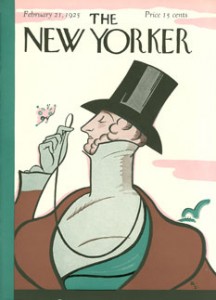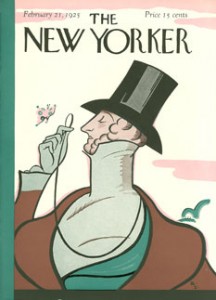- The New Yorker Story of the Year for 2012: “Breatharians” by Callan Wink
 The votes are in and it wasn’t even close! The award for The New Yorker Story of the Year for 2012 goes to “Breatharians” by Callan Wink.
The votes are in and it wasn’t even close! The award for The New Yorker Story of the Year for 2012 goes to “Breatharians” by Callan Wink.The story was a little controversial because of its depiction of some very realistic animal cruelty, but there’s no question that it was memorable. For our discussion here, see: Breatharians by Callan Wink. To read the story in the magazine, go here. (The story is behind a paywall.)
To see a complete list of the finalists, go here.
Congratulations to Callan Wink!
Continue reading → - Vote for The New Yorker Short Story of the Year — 2012
The nominations for New Yorker Story of the Year are now closed. The finalists (with links to the discussions on this blog) are posted below, with the ballot included at the bottom of the page.
A few things to note about the finalists:
I left out some fictions that I really liked, such as Colum McCann’s “Transatlantic” because they were excerpts from novels and I like to keep this a short story contest.
Of the ten finalists, only three of the stories are by women. I liked the Zadie Smith fiction, but again that was an excerpt. I didn’t much care for the Alice Munro stories or the Tessa Hadley or the Alice McDermott or the Rivka Galchen or the Lorrie Moore. No one nominated these stories and I didn’t feel they belonged in the group of finalists.
The finalists:
Means of Suppressing Demonstrations by Shani Boianju
Birnam Wood by T. Coraghessan Boyle
Citizen Conn by Michael Chabon
The Cheater’s Guide to Love by Junot Diaz
The Proxy Marriage by Maile Meloy
Chapter Two by Antonya Nelson
The Semplica-Girl Diaries by George Saunders
A Brief Encounter with the Enemy by Said Sayrafiezadeh
Sweet Dreams by Peter Stamm
Breatharians by Callan Wink
VOTE!
Continue reading → - The New Yorker: “Shirley Temple Three” by Thomas Pierce
 December 24 & 31, 2012: “Shirley Temple Three” by Thomas Pierce
December 24 & 31, 2012: “Shirley Temple Three” by Thomas PierceI gather that Thomas Pierce is a student in the MFA program at the University of Virginia, not far from where I live. Which is neither here nor there, except that it’s quite an accomplishment to have a story in the New Yorker while still a student.
And quite a story it is, too. (It’s not behind the paywall, so you can read it for free, and while you’re there check out the Q&A with Thomas Pierce for a little background on the story.)
Here are the basics: Tommy works in Atlanta on a TV program called “Back from Extinction” on which extinct animals are brought back to life through cloning. Which is how he happens to be in a possession of a dwarf mammoth that he brings home for safekeeping at his mother’s (Mawmaw) place. He promptly disappears and Mawmaw is left to figure out how to care for the animal, which Tommy had named Shirley Temple. When Shirley gets sick, Mawmaw calls the vet, then the pastor, but nothing seems to work.
The situation is interesting and I love the characters, but because I found the ending to be unsatisfying I was really hoping the story was an excerpt from a novel. But apparently not. Tommy is a handsome, unreliable man–apparently he takes after his father, who was married to another woman and so could not marry Mawmaw–who doesn’t seem too bright. Mawmaw, though, is a survivor, and seems to genuinely care for poor old Shirley.
Read the story. What did you think of the ending?
Continue reading → - The New Yorker: “Creatures” by Marisa Silver
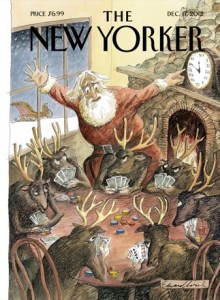 December 17, 2012: “Creatures” by Marisa Silver
December 17, 2012: “Creatures” by Marisa SilverBecause the author has a new novel coming out, I kind of hoped to learn that this story is an excerpt from it. It doesn’t really feel complete to me, and dwells too much in the past. But, apparently, based on the Q&A with Marisa Silver, it’s not an excerpt. So we have to live with what we’ve got.
Since the story is behind the paywall, let me spell it out for you. A husband and wife have a three-year-old son in pre-school. They’ve recently moved from the city where the wife had a hectic and intense medical practice and now they live in a small town—not far from where the husband grew up—and she’s taken over a small town, quiet medical practice. Which they can afford to do because the husband has made a bundle designing and making furniture for a fast-growing chain of coffee shops. But the kid is in trouble at school for pretending to shoot another kid with a stick (his AK47, he calls it) because he’s the police and the other kid is a wobber. (Ugh.) This is problematic for the family because there’s something in the husband’s past, which the wife knows about, that is going to be doled out to the reader in manipulative bit after manipulative bit. Of course we guess what it is, because of the mention of the husband’s childhood friend and guns and funerals. But we’re wrong.
The kid gets suspended for biting the other kid (Hey, they told him not to shoot the boy!) and husband and wife struggle with what it all means and what to do about it.
There is a meditation, of sorts, on violence and boys and guns and hunting, but if there’s a conclusion it’s lost on me. Something like: Boys are violent and they are doomed to brood over it their whole lives.
I did like in the Q&A the comments Silver makes about not starting a story with a theme in mind, only connected threads, and she is content to see what develops. That, I think, is usually the way to build imaginative stories. But this one, in my opinion, is spoiled by the manipulative, drawn out flashback to the husband’s childhood incident.
Continue reading → - Nominations Open for New Yorker Story of the Year
New Yorker Story of the Year
It’s time to select the New Yorker Story of the Year, as we do every year here on Perpetual Folly. Nominations are open! (If you need a refresher, we have discussed every story right here: New Yorker Stories of 2012.)
What are your favorites? Maybe you liked “A Brief Encounter with the Enemy” by Said Sayrafiezadeh from January. Or maybe “Citizen Conn” by Michael Chabon from February? Or “P.E.” by Victor Lodato? Or “The Proxy Marriage” by Maile Meloy? Or “Means of Suppressing Demonstrations” by Shani Boianjiu? Or maybe you liked stories by Antonya Nelson, Alice Munro, Junot Diaz, T.C. Boyle, Alice McDermott, Etgar Keret, Steven Millhauser, or someone else?
Let me know–either shoot me an email or leave a comment here.
Continue reading → - The New Yorker: “A Voice in the Night” by Steven Millhauser
 December 10, 2012: “A Voice in the Night” by Steven Millhauser
December 10, 2012: “A Voice in the Night” by Steven MillhauserI encourage you to read this story, which is available for free online. But that’s only because I’m not sure what to make of it, or how I feel about it. It seems quite a departure for The New Yorker and for Millhauser, and there’s no Q&A with the author (that I’ve found) to help with explication.
The story begins with the Biblical story of the boy Samuel, working for Eli, the high priest of the temple of Shiloh. In the night, Samuel thinks he hears his name called, but it’s not Eli. It happens again and again and eventually Eli tells him that someone else—God—is calling his name. (How much of this is actually in the Bible I’ll leave to others; it’s been a long time since I’ve read that book.)
Now the story jumps ahead a couple of millennia to Stratford, Connecticut in 1950 and another boy, age 7, lying in bed at night waiting to hear his name called. Although his family is non-religious, the boy goes to Sunday school at the Jewish Community Center and he’s heard the story of the boy Samuel who hears his name called in the night.
Jump ahead again and the Author appears. He’s 68 (it happens to be 60 years after the boy in Stratford lay in bed listening for the voice in the night so we can suppose the boy is the Author) and he can’t sleep. He listens to the sounds of the nights, ponders reading something, then thinks of “the boy in the house in Stratford” and acknowledges that he thinks about that boy a lot these days. (The references are all to the boy in the third person, or sometimes second person, suggesting the Author’s distance from the boy, whether or not he is that boy.) He recalls that the boy was isolated in Catholic Stratford.
The story shifts back to Samuel, then the boy, then the Author as each prong of the story proceeds. (There’s a great section where the Author recalls that in the old days he’d recite “fistfuls of sonnets” to help him sleep, and then we get lines from a couple of familiar Elizabethan sonnets.) The Author relates the boy’s experience of family, with visiting grandmothers, living in Stratford, growing up Jewish in a Catholic neighborhood. He keeps asking himself, What is a Jew? (Or is that the boy asking?) And he recalls the lessons the boy learned from his family, including fighting against bigotry. And that his parents are both teachers—they have a “calling” (like Samuel being called in the night) and the boy, the Author, has a calling to write.
Thoughts?
Continue reading → - The New Yorker: “Literally” by Antonya Nelson
 December 3, 2012: “Literally” by Antonya Nelson
December 3, 2012: “Literally” by Antonya NelsonThe Q&A with Antonya Nelson doesn’t provide much insight into this week’s story, although it does help reconcile the fact that there is a whole lot going on in this story. Nelson reminds us that it takes place within the span of one day, and I suppose that does help to frame the story so that it’s not really getting away from the reader.
I have to say, first, that I recognized some elements of this story because they are similar to my own new book, What the Zhang Boys Know. Like my book, a young mother has been killed in an automobile accident, leaving a father to care for his children, and to deal with all the complicated practical aspects of single parenthood. Richard in this story at least has a housekeeper. In my book the father contemplates a replacement wife but, in the meantime, enlists his father’s help.
In any case, in this story the excitement comes from the temporary disappearance of Richard’s son and the son of the housekeeper. It turns out that they’ve taken a bus to the housekeeper’s apartment (in a very different part of town), where they’ve encounter the housekeeper’s violent ex-husband. Meanwhile, the Richard’s son makes a revealing comment that makes Richard think about his late wife, and also to ponder her mental instability.
I was definitely into the story, but I don’t think I love the ending. It’s available online. Read it. What do you think?
Continue reading → - The New Yorker: “Bull” by Mo Yan
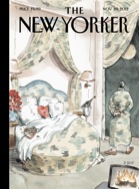 November 26, 2012: “Bull” by Mo Yan
November 26, 2012: “Bull” by Mo YanThis piece is an excerpt from the translation of Nobel Prize winner Mo Yan’s forthcoming novel, Pow. I strongly recommend the piece and the Q&A with Howard Goldblatt, translator as a way of getting to know Mo Yan’s work. And the story is available for free.
This story is set in a village known for its butchers. A boy, the central character of the story, goes with his father to witness the butcher’s buying cattle from visiting brokers. The father is skilled at judging the weight of the cattle and is respected (and paid) for his talents. But a local butcher is jealous and tries to embarrass the father. The boy is humiliated by this. But then, the butcher’s bull rebels and only the boy’s father can save the day. (The story is also complicated by the fact that we know the father is going to run off with a woman and leave the boy and his mother to fend for themselves.)
It’s always hard to know what to do with excerpts, or how to interpret them. The value of this one is that if gives us a glimpse into Mo Yan’s work, but the “story” itself doesn’t do too much for me.
I’d love to see the book.
Continue reading → - The New Yorker: “Demeter” by Maile Meloy
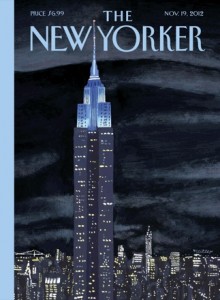 November 19, 2012: “Demeter” by Maile Meloy
November 19, 2012: “Demeter” by Maile MeloyDemeter is recently divorced from Hank, sharing custody of their daughter Perry (real name Elizabeth, but so nicknamed for Perry Mason because of her interrogatory stare as an infant). But Demeter is emotional about parting from Perry, and can’t hold back the tears. At home, everything makes her think of Perry, of course, and so she has to leave the house. She goes to the pool to swim and she sees Annie, the daughter of Duncan, Hank’s former business partner with whom Demeter had had an affair. Both Hank and Demeter feel guilty about Duncan’s death, and there is a hint that the accidental drowning is somehow responsible for their divorce.
At the pool, a thunderstorm arrives and Annie, the lifeguard, gets everyone out. The guards cover the pool and inside the guard office Demeter watches the August snowstorm (it’s Montana) with the kids. When the brief storm has passed, she joins the kids for game (that I don’t quite follow) of jumping across the pool on the covering blanket.
The key to the meaning of the story, if there is any, must be in the name Demeter. Demeter is the Greek goddess of the harvest who also presided over the sanctity of marriage, the sacred law, and the cycle of life and death, and also had to share custody of her daughter, Persephone, with Hades. And so the name seems incredibly heavy handed both for the story’s plot and its theme.
I’d welcome any suggestions that there might be more here.
The Q&A with Maile Meloy doesn’t reveal too much except for an interesting story about a change that she made to the ending of “Demeter.”
Continue reading → - The New Yorker: “Member/Guest” by David Gilbert
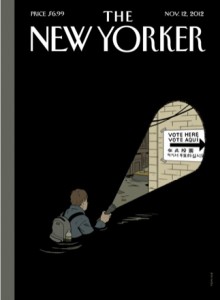 November 12, 2012: “Member/Guest” by David Gilbert
November 12, 2012: “Member/Guest” by David GilbertThe author has a novel coming out later this year so I was convinced that this story must be an excerpt, but based on the Q&A with David Gilbert it does not seem to be. As a stand-alone story I didn’t find it particularly satisfying.
Beckett is a 14-year-old girl, hanging out at the Long Island beach club with her friends in August. They talk about the stuff that such girls talk about (I guess). They drink Shirley Temples at the bar (because grenadine is more interesting than pink lemonade) and pair off against each other. Beckett has a brief encounter with her parents and their friends (who are told by Beckett’s mother that she’s bored, but next year will probably spend the summer in France, or Cambodia, or somewhere).
And then we get to the point of the story as Beckett waits for her friends to return and she chats up the guy whose job it is to keep non-members out of the club. Beckett’s a snob and it isn’t clear that she sees this guy as a real person (one of her friends calls him retarded), although she subjects him to questioning. She never asks his name.
And then their brief encounter is over and she rejoins her friends on the beach where they realign to abuse one of the other girls.
Can’t say I loved this one. (But be sure to read the Q&A linked above for the part where Gilbert speculates about the future for these girls. That’s better than the story, in my opinion.)
Continue reading →

Clifford Garstang
Writing, Reading, Editing
